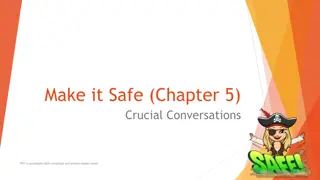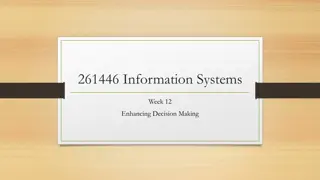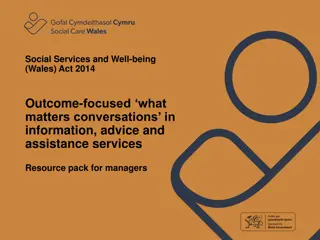Conversations and Decision Making
Various scenarios where individuals engage in conversations about different topics like looking at pictures, splitting bills, discussing new jobs, making purchases, and managing time. The interactions showcase decision-making processes and communication skills in everyday situations.
Download Presentation

Please find below an Image/Link to download the presentation.
The content on the website is provided AS IS for your information and personal use only. It may not be sold, licensed, or shared on other websites without obtaining consent from the author.If you encounter any issues during the download, it is possible that the publisher has removed the file from their server.
You are allowed to download the files provided on this website for personal or commercial use, subject to the condition that they are used lawfully. All files are the property of their respective owners.
The content on the website is provided AS IS for your information and personal use only. It may not be sold, licensed, or shared on other websites without obtaining consent from the author.
E N D
Presentation Transcript
11661166 ( ~ )
1 M: Look! This picture is from last spring. W: What a beautiful garden! M: Amazing, isn t it? And the skyscrapers in the distance. W: Uh-huh. By the way, who s the woman beside you?
2 How much of their own money will each person pay? dollars dollars dollars dollars
2 W: Our bill is 85 dollars. M: I have a fifteen-dollar discount coupon. W: Remember, Mom gave us ten dollars. Let s use that as well. M: OK, and then we can split the rest.
3 What does the woman say about her new job? Employees are free on weekends. It takes too much time to get to work. She gets along with her colleagues. The boss is often away on business.
3 M: How s your new job? W: Well, my boss is OK, and I don t spend much time commuting. M: But I ve heard you often work weekends. W: Still, I enjoy being with my co-workers.
4 What will the man do? Get a new model later. Get a new model now. Get an old model later. Get an old model now.
4 W: Our shop recommends this new phone. M: Is there anything cheaper? W: The earlier model s out of stock but will arrive soon. It s half the price. M: Could you hold one for me?
5 M: Let s go! The meeting will start soon. W: We still have plenty of time. Doesn t the meeting start at 2? M: Yeah, in ten minutes. W: Oh, no! My watch is 20 minutes behind.
6 W: Our survey shows the number of foreigners visiting our museum has been decreasing. M: Especially from Europe. W: But the number from Asia is on the rise. M: At least that s good news.
7 Oh, I forgot to go shopping. Oh, you should ve reminded me. Sure, anything but batteries. Sure, the shop by the station.
7 W: Ah, Marcos, there you are. M: I just came back from the store. W: Did you get everything? How about the batteries?
8 OK, don t you have any? OK, give me another minute. OK, is it your second time here? OK, you can ask which is which.
8 M: Ready to order? W: No, not yet. Do you have any vegetarian meals? M: They re on the second to the last page.
9 Sure, they won the contest. What if you were? Why don t they try? You re not the only one.
9 M: What did you think of the drawing contest? W: To be honest, I m kind of surprised Hiroshi won. M: Right. I thought Ayako had a good chance.
10 Oh, I didn t know any of them. Oh, you can tell others. Umm, they are not fast enough. Umm, we could look it up.
10 W: Grandpa, which runs faster, a lion or a tiger? M: Well, which do you think is faster, Patty? W: I m asking because I don t know.
11 Right, for the time being. Right, forty on white. Well, let me choose white. Well, the other way around.
11 M: Jane, how many copies do we need? W: Twenty copies on white paper and twice as many on pink. M: OK, 20 on pink and 40 on white.
12 I think the class is pleasant. I m not really worried that much. Luckily, there were no maps on the test. Whatever grade you were in.
12 W: So, how was your geography class this term? M: All right, Mom. It was fun, and I do like maps. W: Do you think you ll get a good grade?
13 Did I? Did it? Did we? Did you?
13 W: Morning, Steve. Is something wrong? M: I changed my computer password. Now I can t remember it. W: I think you told me yesterday you d changed it back to what it was before.
14 What will they do about dinner? They ll eat curry at a restaurant. They ll eat curry at home. They ll eat fried rice at a restaurant. They ll eat fried rice at home.
14 W: What s for dinner tonight, Dad? M: Hmm, we have vegetables in the fridge for fried rice. W: You re not going shopping? Then let s eat out. M: It s pouring outside. I d rather stay home. W: What about the restaurant around the corner? I feel like curry. M: OK, they deliver, and I won t need to cook.
15 How long can a person extend online? One week Two weeks Three weeks Four weeks
15 M: How many books can I borrow from the library? W: Up to four at a time. M: For how long? W: Two weeks, but you can extend the period a week at a time if no one has requested the book. M: Can I do it online? W: Sure, but only once for online extensions.
16 What will the man find out about his neighbor? How long he has been a doctor What hospital he works at When he started the volunteer work Who he volunteers for
16 W: Did you do the homework about interviewing someone you admire? M: Yes. Who did you interview? W: My aunt. She s a doctor. How about you? M: My neighbor. He volunteers at an animal shelter. W: Good for him! How long has he been doing that? M: Oh, I ll have to ask him.
17 Which cruise are they most likely going to take? : am : am : pm : pm 18 Which restaurant are they going to go to for lunch? The Chinese restaurant The French restaurant The Italian restaurant The Mexican restaurant 19 What places are they planning to go to tomorrow? The castle and the children s zoo The castle and the falls The children s zoo and the orchard The falls and the orchard
17 18 19 M: OK, how about a cruise first? W: Sounds great! It lasts an hour, so we could have lunch after that. M: This restaurant looks good. It s probably 30 minutes or so from the pier. If we leave right after the cruise, we can get there around noon. W: Perfect! There s a castle just north of it. What do you think? M: Yeah , I was hoping we could take the kids here to feed the rabbits before heading to the hotel. W: OK, let s visit the castle tomorrow, then. M: All right. Oh, there s apple picking. Hmm, it s a shame it s too early in the year. W: Don t forget, we need to be at the hotel by 5:30 for dinner. M: Right. Look! How about stopping here? It s on the way from the zoo to the hotel. We could take our annual family photo there. W: Maybe that s too much for one day. M: I suppose . Let s do that tomorrow afternoon.
20 What bothered the speaker about cleaning? Following instructions Returning before 10 pm Sweeping the floor Waking up early 21 What was the speaker s opinion about phones in the dormitory? Mobile phones should have been allowed. Mobile phones should have been cheaper. Phones should have been placed in each room. Phones should have been placed on each floor. 22 Which of the following would be the best title for this story? How I challenged the strict Japanese dorm system How I improved the rules of a Japanese dorm How I matured while living in a Japanese dorm How I survived a Japanese dorm without a phone
20 21 22 available back then. Amazingly, the only phone was on the first floor, and we took turns answering it. I knew having a phone in each room was too costly, but surely a phone on each floor reasonable. Many of these duties and rules felt like burdens to me. Although it was a huge challenge communicating in a foreign language and dealing with these obstacles, it turned out to be beneficial for me. It forced me to improve my language ability and adapt very quickly. I realize now that overcoming these difficulties helped me grow up and become a more responsible person. When I was an exchange student in Japan over 20 years ago, I lived in a dormitory. It was an unforgettable, experience. Several, things bothered me during that time, Japanese, performing dorm duties, and obeying dorm rules troublesome. For example, there was a curfew, which meant we had to return no later than 10 in the evening. One of the duties was cleaning the floors and the bathroom. I wouldn t have minded, but it had to be done before everyone else got up. transforming would ve been though. Learning were especially Telephone responsibility. duty was another phones annoying weren t Mobile
Tokiko, Justin, Karen 23 What is Justin most concerned about? Academic preparations Cultural aspects Personal safety Travel arrangements 24 What is Tokiko s advice regarding what to pack? Bring enough money to last the trip. Consider the climate of your destination. Make sure your suitcases are not too heavy. Take a journal to write about experiences. 25 Which of the following best describes the conversation? They all shared personal episodes. They came to a definite conclusion. They debated the value of studying abroad. They each emphasized a different point.
23 24 25 Tokiko : Thanks for coming to the meeting. The international programs office has asked us to put together a booklet for students going abroad. Since all of us have studied abroad, they think our suggestions will help other students get ready. Justin, what do you think we should include? Justin : Well, Tokiko, we need to focus on practical items first. For instance, sometimes it takes a while to get passports and visas. We could suggest they start that process early. Also, they ll need a health check and travel insurance. Karen, did you have something to add? Karen : Yeah, I m thinking about cultural aspects. Don t they need to know some history or study about the society and learn the local customs long before they leave? Maybe they should consider these things in order to choose a country of destination. Tokiko : That s right, Karen. Preparing to live there has to come first. Also, what they pack in their suitcases depends a lot on where they go. That s a really fun part deciding what to take. In my experience I was glad I took light clothing I could wear in layers, rather than heavy, winter clothes. Justin : OK, but there are still other things to do before you actually pack. What about airline tickets? Getting tickets early can save money, and there ll be more choices of dates. So I think that also needs to be on the list. Karen : That s true, shouldn t buy tickets until you re sure you have permission to live there . Oh, I know what else we could do! Maybe we can include short essays or personal stories about our experiences and host families. It might help students get mentally prepared. Tokiko : That s an option . Well, we re getting there, but we still have a long way to go. Justin, but you really






















